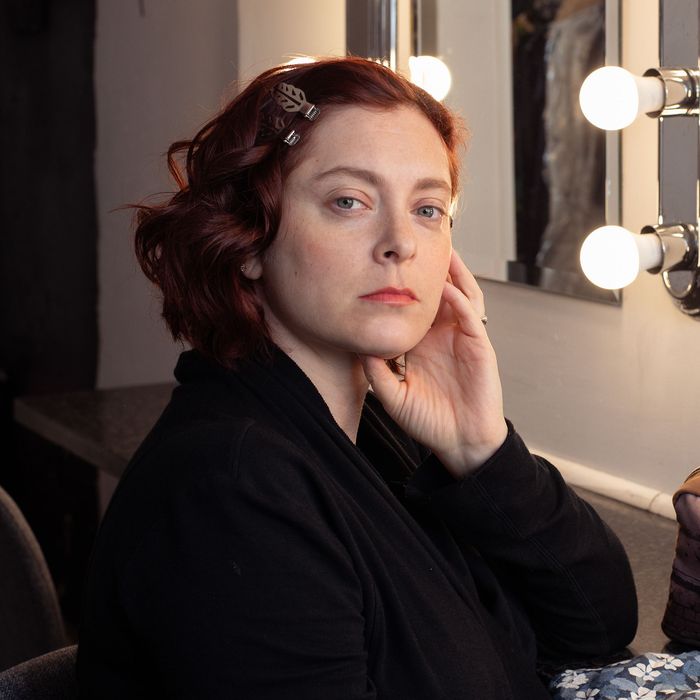
A few weeks ago, Rachel Bloom’s 3-year-old asked her if she’s going to die. “My husband and I answered with ‘We are going to be around to care for you for a long time,’” she tells me in an East Village café across the street from the Orpheum. “And that assuaged her because she’s not actually asking if we’re going to die. From reading and talking to my own therapist, I know they’re asking, ‘Are you going to leave?’ Not ‘Explain the nature of death and decomposition to me.’” Then again, most toddlers’ mothers don’t have a job like Bloom’s.
Death, Let Me Do My Show, her one-woman Off Broadway production, is about Bloom’s longtime musical collaborator Adam Schlesinger’s sudden death from COVID complications in a New York hospital in April 2020, which coincided exactly with the birth and NICU stay of her first child on the opposite coast. Bloom’s daughter is now fine, but Schlesinger’s death floored Bloom in a way she was utterly unprepared to cope with, which is why, nearly four years later, she has found herself reliving it onstage every night in front of an audience in song and dance.
This may seem like a weird creative choice and an unpalatable night out at the theater. Who wants to return to 2020, or their own pandemic-related grief and tragedies, even for a minute? Most new TV seasons and movies completely sidestep the height of the pandemic — that, or they get it really wrong by rolling around in it, like the unwatchable 17th season of Grey’s Anatomy, in which everyone was always in full protective gear (not hot). And while others may beg to differ, I couldn’t get myself to pick up Gary Shteyngart’s novel Our Country Friends, about people riding out the pandemic upstate. Too soon, especially for people without country houses. Head-on realism doesn’t seem to be the best genre through which to tackle that terrible time, at least not yet.
Bloom knows this; in fact, it’s the entire hook of her show, which extended its run after a sold-out initial month at the Lucille Lortel Theatre and moved across town to the Orpheum. The conceit: Bloom goes onstage attempting to perform material she wrote in 2019, but instead must confront the events of the past four years. A collective cringe washes over the room as Bloom begs not to be forced to revisit the pandemic; we don’t want to revisit it either. At first, it’s hard to imagine that Bloom’s signature parodic style will do justice to the task at hand. But over the next hour or so that’s exactly what she does, using the built-in tropes and inherent corniness of musical theater to tiptoe her way into saying something profound about grief and loss.
It’s a style that she honed over four seasons of her musical sitcom, Crazy Ex-Girlfriend, whose songs she co-wrote with Schlesinger. When it first aired in 2015, when Bloom was just 28, Crazy Ex-Girlfriend won awards and acclaim and quickly gained a cult following that included intellectuals like Zadie Smith, who said she could write 5,000 words about her love of the show. (It was also one of the least-watched network shows ever to run for four seasons — not everyone loves musical theater.) Bloom played a lawyer who was eventually diagnosed with borderline personality disorder. In person, as we sip hot beverages, Bloom has a much calmer energy than her character in the show, Rebecca Bunch; she reminds me of any number of open, happy, slightly beleaguered working moms I know and love. She also has a hacking cough that’s lingering, not contagious. “Please feel free to write about my excessive amount of phlegm,” she reassures me. Bloom has never been wary of putting the unspeakable front and center; in fact, it’s kind of her thing.
The way Bunch’s diagnosis was depicted on the show won raves from mental-health advocates for its realism. In one particularly memorable song, a classic Broadway showstopper called “You Stupid Bitch,” the protagonist sings to herself, “You ruined everything, you stupid, stupid bitch,” in a slinky sequined dress under a spotlight as an enthralled audience cheers. The juxtaposition captures how it’s possible to feel like the center of the universe and, simultaneously, have invasive thoughts of self-hatred shouting in your brain on a loop with no end. It’s both dark and surprisingly catchy, an early announcement of the kind of depth Bloom is capable of when she plays with her medium.
One of Death, Let Me Do My Show’s most moving, complex, and ultimately funny numbers, titled “Lullaby for a Newborn,” is tenderly sung to a water bottle. Bloom evokes the mindfuck mix of relief that your newborn baby is asleep and the sudden terror that they’ll stop breathing, which you are inescapably aware is something that could just … happen at any moment. “Please don’t die,” she sings pleadingly to the water bottle, moments before switching gears and drinking from it.
Bloom’s no-longer newborn is now following in her mother’s footsteps: “She’s already making up parody songs. There’s a song called ‘Spooky, Scary Skeletons,’ a great Halloween song. She made it ‘Poopy, Scary Skeletons.’ She’s like, ‘Poopy, scary skeletons are peeing in your eye.’ I was like, I mean, I’m done.”
Death is also the theme of the next project Bloom hopes to work on. Based on a real place called Comfort Zone Camp, with Shiri Appleby slated to direct, it’s about a grief camp for children who have lost a parent. The plot hinges on a woman who volunteers there and must finally deal with the death of her own father. “If you know someone who has a couple million dollars, let me know,” Bloom says, laughing. “You need one backer, one person to believe in you. Crazy Ex-Girlfriend, we had Mark Pedowitz at the CW. Hollywood is not a monolith. It’s much more like the stock market; it’s looking for where lightning has struck a little bit.” She’s all too aware of the illogic of the market after her Hulu sitcom Reboot was canceled after one season early last year. “I was surprised,” Bloom says. “I think that if we’d premiered a year previously” — before streamers cut back and before the entertainment-industry strikes loomed — “I suspect we would’ve gotten a second season. There was just more money.”
She’s banking, though, on death and grief becoming more prominent in pop culture in the same way that mental health has since Crazy Ex-Girlfriend; Bloom understands that by poking at sore spots, she increases her chances of making work that’s ahead of its time. Since Crazy Ex-Girlfriend ended, it has found a second life on streaming as the culture has caught up to its themes and its bits have been atomized into memes: “We aired just before TikTok hit, which, between mental-health conversations and music, would’ve been huge for us.” Bloom is used to people assuming she has a personality disorder like Rebecca Bunch, but she doesn’t. She just has garden-variety generalized anxiety disorder and ADHD, which she manages with talk therapy, 20 milligrams of Prozac, and a tiny bit of Adderall on days she needs to focus.
We walk across the street to the theater, where Bloom continues to tinker with the pacing as performances go on through Jan. 6: “Every time I watch the show, I’m always like, I want to get to death faster.” She says the project is still a work-in-progress as she grapples with the awareness, every day, that the world isn’t “back to normal” — that any stasis we once assumed was possible has been replaced by a state of perpetual crisis.





